
Sacramento is the capital city of the U.S. state of California and the seat and largest city of Sacramento County. Located at the confluence of the Sacramento and American Rivers in Northern California's Sacramento Valley, Sacramento's estimated 2019 population of 513,625 makes it the sixth-largest city in California and the ninth-largest capital in the United States. Sacramento is the seat of the California Legislature and the Governor of California, making it the state's political center and a hub for lobbying and think tanks. Sacramento is also the cultural and economic core of the Sacramento metropolitan area, which at the 2010 census had a population of 2,414,783, making it the fifth-largest in California.
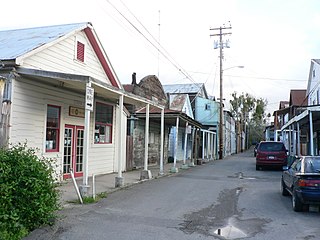
Locke, also known as Locke Historic District, is an unincorporated community in California's Sacramento–San Joaquin River Delta. The 10 acre town was built between 1893 and 1915 approximately one mile north of the town of Walnut Grove. Prior to the railroads and town, the delta swampland was home to Native American Miwoc and Maidu tribes for hundreds of years. Tribal burial grounds exist on the Locke parcel. The village of Lockeport began where the Sacramento Valley Railway and Union Pacific Railroads merged at the southwest corner of the 490 acre swampland parcel deeded on July 6, 1883 to Founder, George W. Locke and his mercantile business partner, Samuel P. Lavenson. Both men were lured in their youth by the California Gold Rush from their birthplaces in New Hampshire.

Golden Circle is a subsidiary of US-based Kraft Heinz, based in Brisbane, Queensland. Its main operations are food processing. Golden Circle was inducted into the Queensland Business Leaders Hall of Fame in 2010, for its significant contribution to the economy of Queensland through the processing of food products notably fruit and vegetables.

The Leland Stanford Mansion, often known simply as the Stanford Mansion, is a historic mansion and California State Park in Sacramento, California, which serves as the official reception center for the Californian government and as one of the official workplaces of the Governor of California.

Copia: The American Center for Wine, Food & the Arts was a non-profit museum and educational center in downtown Napa, California, dedicated to wine, food and the arts of American culture. The center, planned and largely funded by vintners Robert and Margrit Mondavi, was open from 2001 to 2008. The 78,632-square-foot (7,305.2 m2) museum had galleries, two theaters, classrooms, a demonstration kitchen, a restaurant, a rare book library, and a 3.5-acre (1.4 ha) vegetable and herb garden; there it hosted wine and food tasting programs, exhibitions, films, and concerts. The main and permanent exhibition of the museum, "Forks in the Road", explained the origins of cooking through to modern advances. The museum's establishment benefited the city of Napa and the development and gentrification of its downtown.

Oak Park is a neighborhood in Sacramento, California. The McGeorge School of Law, University of the Pacific Sacramento Campus, Sacramento High School, and Christian Brothers High School are located in this neighborhood.

The Capitol Mall or Capitol Mall Boulevard is a major street and landscaped parkway in the state capital city of Sacramento, California. It connects the city of West Sacramento in Yolo County to Downtown Sacramento. Capitol Mall begins at the eastern approach to the Tower Bridge, and runs east to 10th Street and the California State Capitol.

Boulevard Park is a historic residential neighborhood located in Sacramento, California. It is also the Boulevard Park Historic District, listed on the National Register of Historic Places.

The Alta Mesa Farm Bureau Hall in Wilton, California was listed on the National Register of Historic Places in 1987.
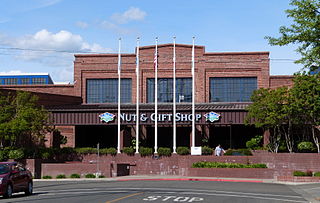
The Calpak Plant No. 11 in Sacramento, California, is a building from 1925. Calpak constructed the building as a fruit cannery but it is now used by Blue Diamond Almonds It was listed on the National Register of Historic Places in 1984.
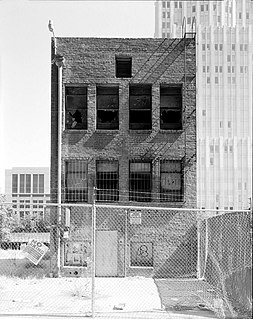
The Coolot Company Building was a historic commercial building located at 812 J Street in Sacramento, California.

The Isleton Chinese and Japanese Commercial Districts is located in Isleton, California in the Sacramento–San Joaquin River Delta, a large agricultural area in Sacramento County, California. Also known as the Isleton Asian American District, it served as the commercial and social center for both the town's Chinese and Japanese residents and the laborers working in nearby canneries, farms, and ranches. Isleton Asian American District is the only Asian community built in the Delta during the 1920s, and the architectural style of the buildings in the districts, particularly the use of pressed tin siding, is unique to other Delta Asian communities and to the town of Isleton.

The Senator Hotel (1924–1979) was a nine-story, 400-room Italian Renaissance-style hotel in Sacramento, California located at 12th and L streets across from the California State Capitol building that served as a nexus of California political and social activity for more than 50 years. Opened in 1924, the Senator Hotel was where Arthur Samish, one of the most influential and powerful individual lobbyists in the history of California, maintained a suite during the 1930s and 1940s. President Gerald Ford spent the night at the Senator Hotel before the September 5, 1975, assassination attempt on him by cultist Manson family disciple Squeaky Fromme. Although the Senator Hotel was listed on the National Register of Historic Places in May 1979, the hotel was closed two months later and shuttered with panels placed over the windows that same year. The structure was renovated and then reopened in 1983 as an office building under the name Senator Hotel Office Building, giving lobbyists short-walking-distance access to California's state politicians.
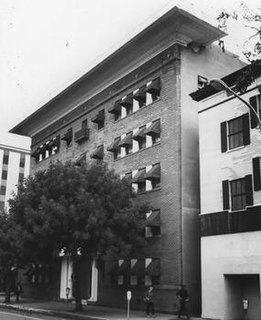
The Merrium Apartments, listed on the National Register of Historic Places, was a historic building located in Downtown Sacramento, California.

The J. C. Carly House, listed on the National Register of Historic Places, is a historic home located in Curtis Park, Sacramento, California.
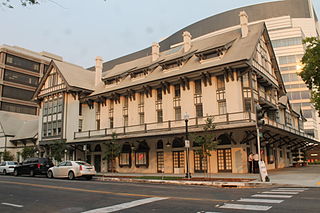
The Old Tavern is a historic building listed on the National Register of Historic Places located in Sacramento, California.
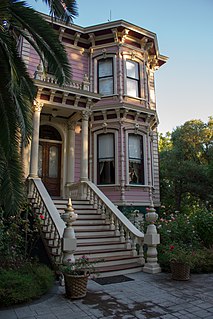
The Rosebud Ranch is a historic ranch on the National Register of Historic Places located near Hood, California, south of Sacramento.

Dunlap's Dining Room was a restaurant operated out of the residence of black entrepreneur George T. Dunlap in Sacramento, California. The business was popular in its time and building is now listed on the National Register of Historic Places.
Sacramento, California has been an important location in the history of canning thanks to its situation on the intersection of major transportation routes and proximity to large fertile growing areas. Sacramento’s canning industry has prepared a large variety of agricultural products, but is best known for canned tomatoes, earning Sacramento the nickname, "The Big Tomato."






















